ACPS superintendent proposes $340 million capital budget for aging facilities
10-year plan emphasizes infrastructure maintenance, capacity adjustments and middle school conversions
Alexandria City Public Schools Superintendent Dr. Melanie Kay-Wyatt presented a proposed $340.4 million Capital Improvement Program budget for fiscal years 2027-2036 at Thursday’s school board meeting, outlining a decade-long strategy to address aging infrastructure and prepare for shifting enrollment patterns.
The 10-year capital plan includes $27.9 million for fiscal year 2027 and focuses primarily on maintaining school facilities and addressing capacity needs as the district works to balance middle school enrollments across its system, according to district documents.
“Our aging school buildings are being transformed into safe, welcoming, and modern learning environments,” Kay-Wyatt said in a press release. “Investing in our facilities extends beyond the school day, creating spaces the Alexandria City community can share, enjoy, and take pride in together.”
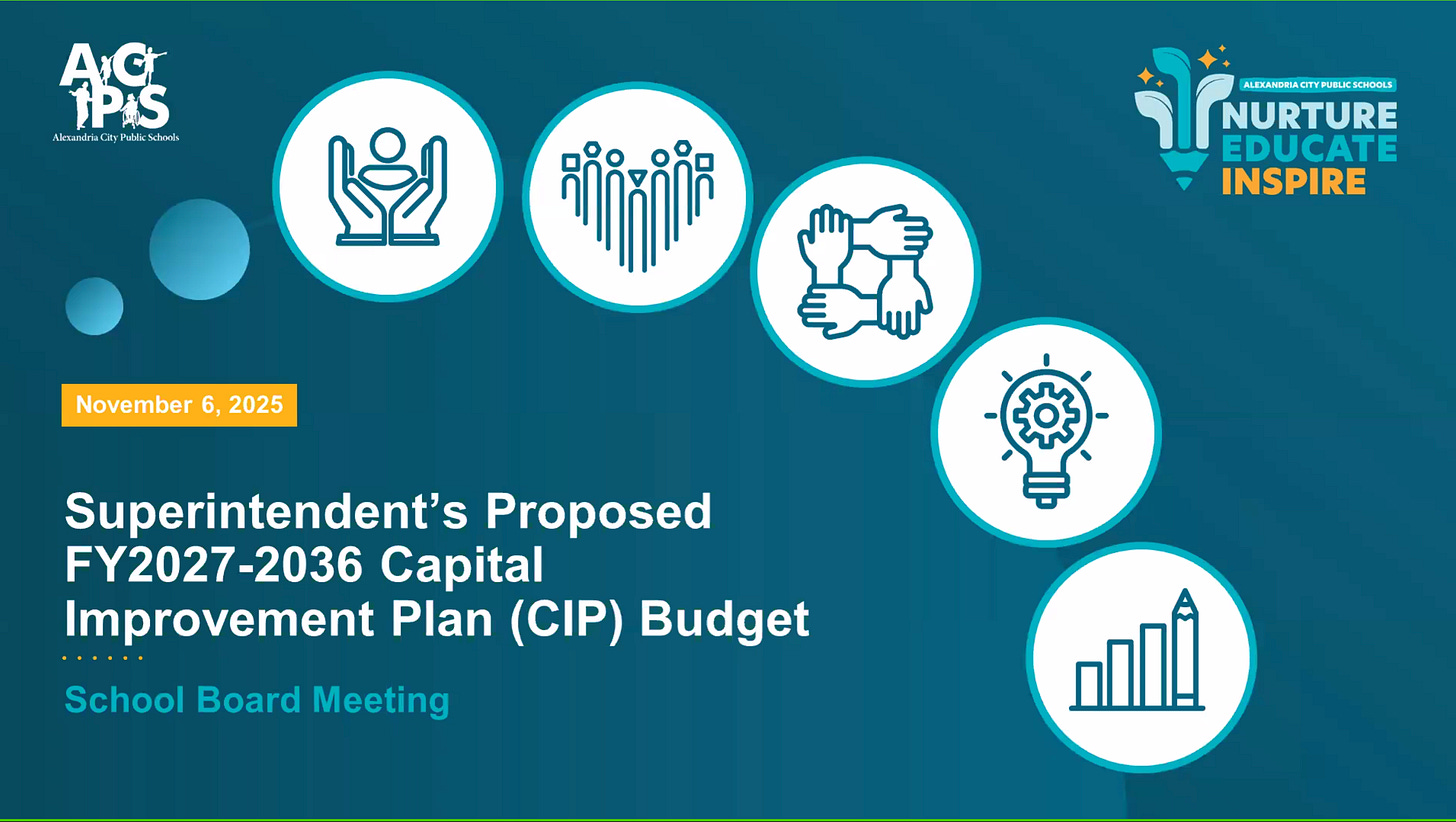
Addressing Aging Infrastructure
The proposed capital budget prioritizes addressing the aging infrastructure of ACPS facilities, with several buildings approaching or exceeding 30 years old requiring major system renovations or replacements, according to presentation materials.
“Strategic investment today helps us avoid the greater cost of deferred maintenance tomorrow,” Kay-Wyatt said during her presentation.
Key components of the fiscal year 2027 budget include $6 million for HVAC repairs and replacements at Ferdinand T. Day Elementary, Mount Vernon Community School and John Adams Elementary, according to the proposal. The superintendent noted that Ferdinand T. Day, despite being a relatively recent office-to-school conversion, has building systems approaching 25 years old that are nearing the end of their useful life.
“Ferdinand [T.] Day is one of ACPS’s first successful office-to-school renovations,” Kay-Wyatt said during the presentation. “However, the building was originally built in 1999, and its building systems are approaching the 25-year mark.”
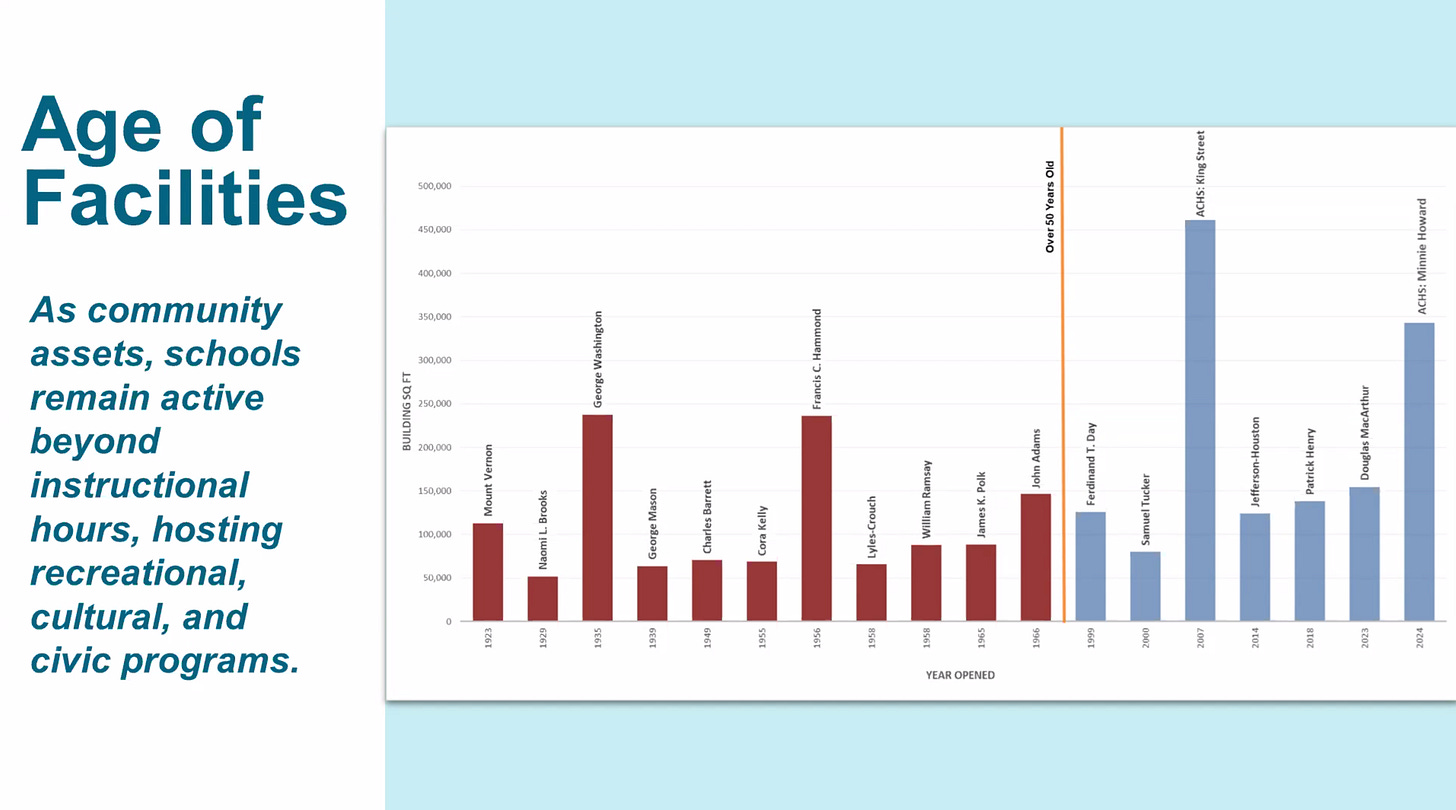
The budget also allocates $5 million for leased space renovations, including ACPS space at 216 N. Payton St., which houses the Chance for Change alternative program and other administrative functions, according to district documents.
Major Capacity Projects Planned
The 10-year plan includes several significant capacity projects aimed at addressing middle school enrollment imbalances. The projects align with recommendations from the district’s K-8 grade level analysis completed earlier this year.
The Cora Kelly School for Math, Science and Technology modernization remains the largest single investment, with $105 million allocated across the 10-year period, according to the proposal. The project includes $19 million for design and project management in fiscal year 2028 and $86 million for construction beginning in fiscal year 2029. The modernization will increase the elementary school’s capacity to 720 seats and address needed infrastructure improvements for the building, which is located in a Resource Protection Area and is encumbered by floodplain concerns.
“Planning for Cora Kelly as it is in the 10-year CIP begins [in] FY28, targeting [a] FY32 opening,” Kay-Wyatt said during the presentation.
The budget proposes converting Jefferson-Houston School into an 850-student middle school, with $2.7 million for design work in fiscal year 2030 and $27.5 million for construction in fiscal year 2031, according to presentation materials.
Patrick Henry K-8 School would be converted into a K-5 elementary school under the plan, with $858,000 for design in fiscal year 2031 and $8.6 million for construction in fiscal year 2032.
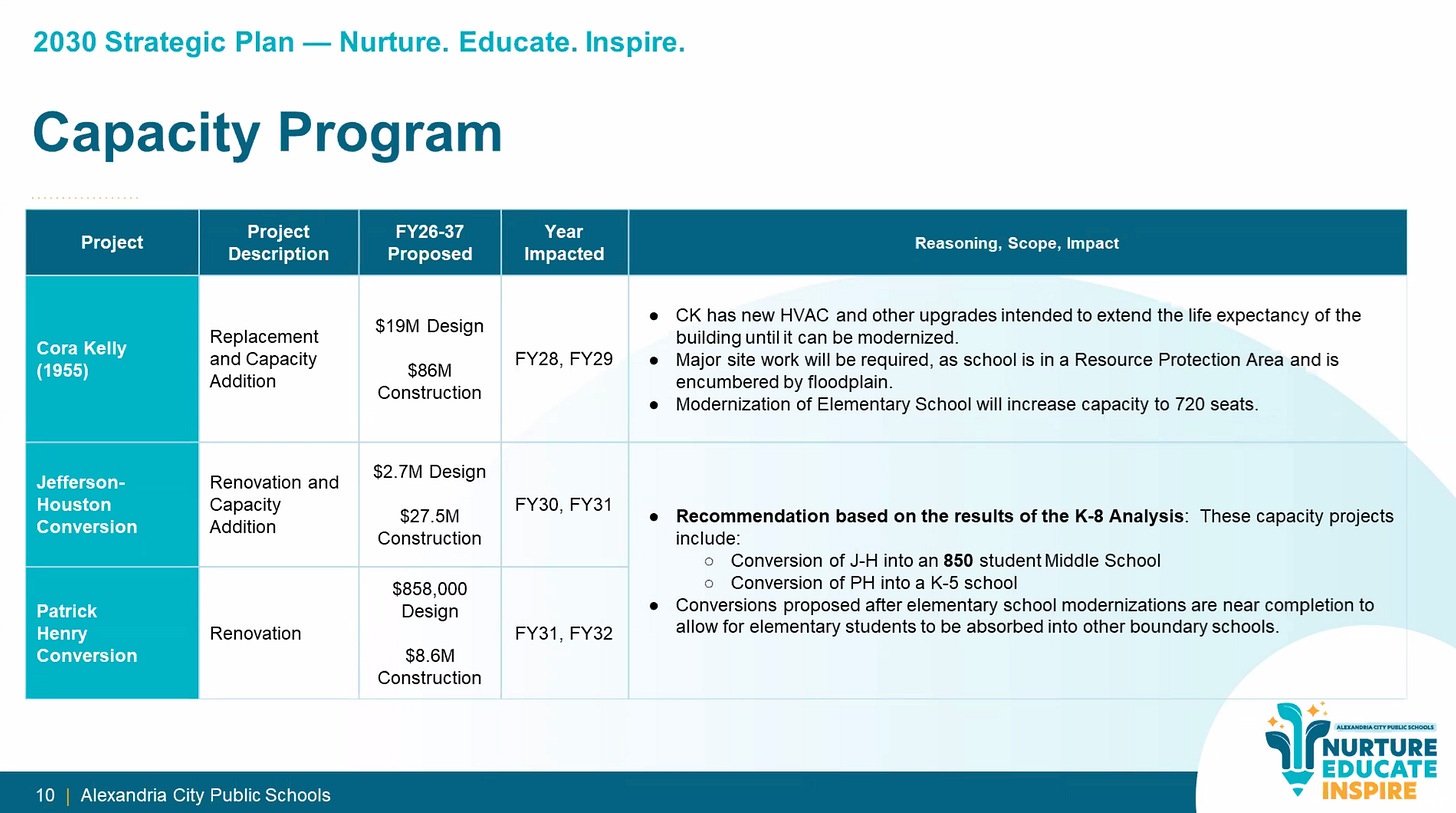
“On the capacity side, we have several significant projects which are not new to the 10-year CIP plan,” Kay-Wyatt said during her presentation. “Jefferson Houston could be converted into an 850-student middle school and Patrick Henry, of course, into a K-5 school.”
The conversions are proposed to take effect after elementary school modernizations are near completion, allowing students to be absorbed into other boundary schools.
Budget Constraints And City Guidance
The proposed CIP budget reflects guidance from the city of Alexandria to maintain funding at existing or lower levels for fiscal years 2027-2036. The city recommended that any new major school renovation or replacement projects include design funding no earlier than fiscal year 2034.
“In October of 2025, the city provided formal guidance for the CIP instructing ACPS to maintain funding at existing or lower levels for fiscal years 27 to 36,” Kay-Wyatt said during the presentation.
Despite these constraints, the 10-year proposed CIP totals $340.4 million — $6 million less than last year’s school board-approved plan and approximately $54.6 million less than city guidance over the decade, according to budget documents.
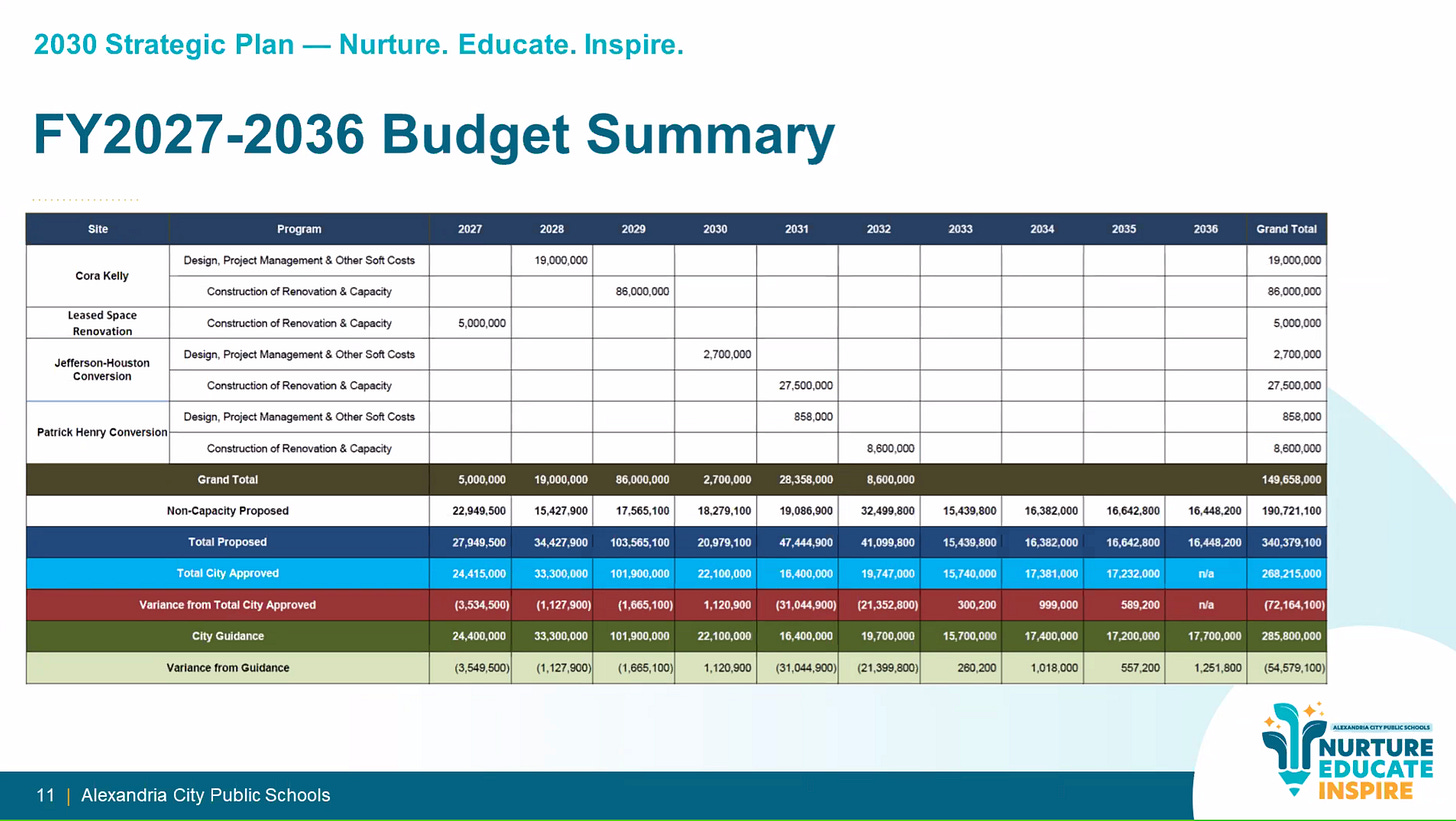
The largest variance from city guidance occurs in fiscal year 2031, when the proposed budget exceeds guidance by $31 million, primarily due to the Jefferson-Houston conversion construction costs, according to the budget breakdown.
For fiscal year 2027, the proposed budget of $27.9 million is approximately $3.5 million above the city-approved amount of $24.4 million.
“This proposed budget is necessary to meet the educational safety and programmatic needs of our schools in the coming decade,” Kay-Wyatt said during her presentation.
The budget challenges come as the district faces a $15.1 million operating budget shortfall for fiscal 2027, with city officials projecting minimal revenue growth, as The Alexandria Brief previously reported. School officials told the City Council on Nov. 2 that they need $19.3 million to maintain current service levels, but can expect only a $4.2 million increase from the city.
Non-Capacity Investments
Beyond the major construction projects, the budget includes funding for ongoing facility maintenance and upgrades, including HVAC system replacements, roof repairs, kitchen modernizations, and technology updates such as interactive whiteboard replacements, according to district documents.
The budget also provides funding for curriculum materials, textbooks, and other instructional resources to support academic standards, according to the press release.
Next Steps
The school board will hold work sessions on Nov. 13 and Nov. 18 to discuss the capital budget in detail. The November 13 session will include a public hearing, beginning at 6 p.m., which will allow community members to share their input on the proposed plan.
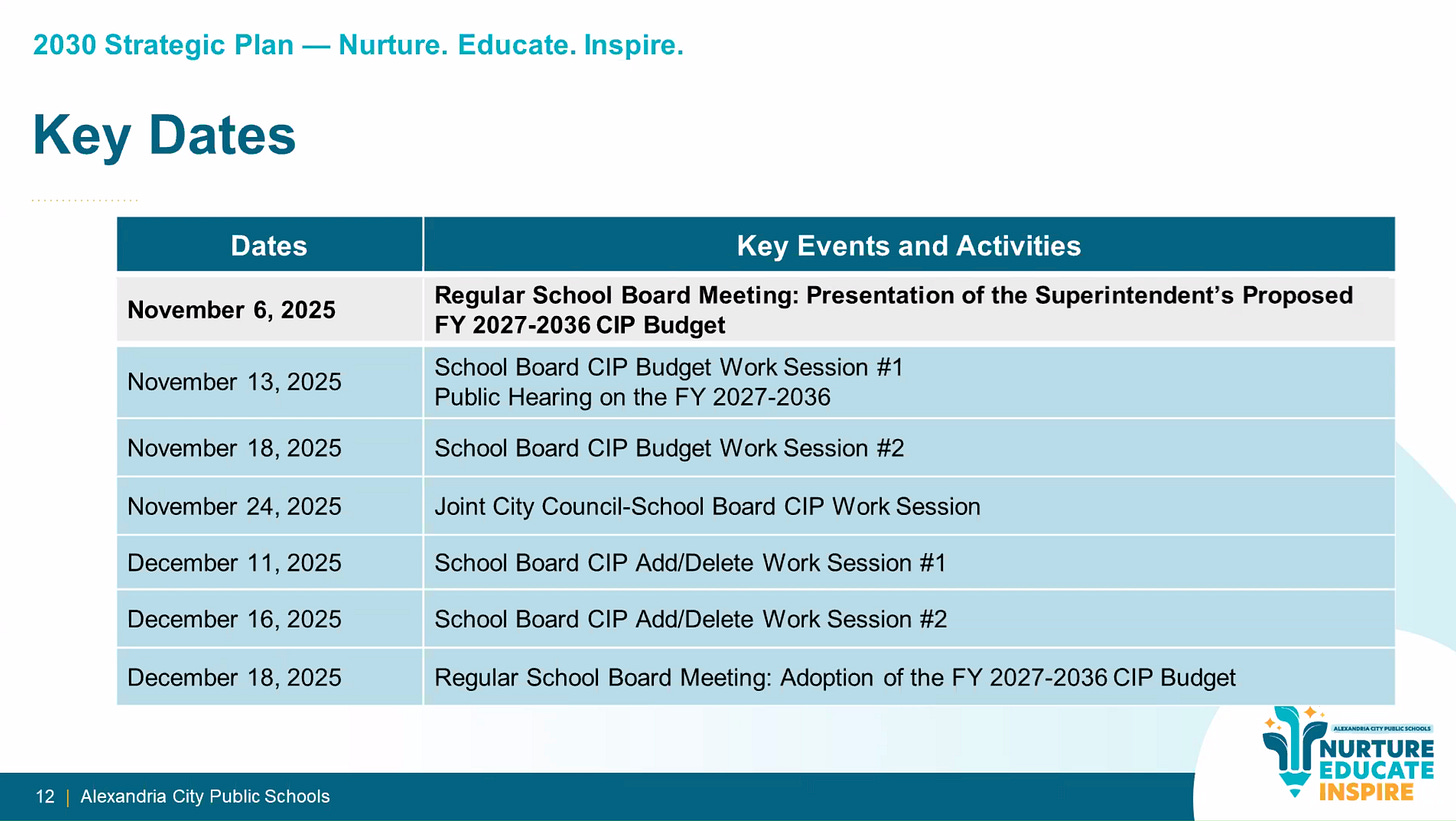
Board members’ formal written questions are due by November 17. The board will hold additional add/delete work sessions on December 11 and December 16, before the final adoption is scheduled for December 18.
The school board will also hold a joint work session with the Alexandria City Council on Nov. 24 to discuss the capital improvement priorities.
Members of the public who wish to give remarks on the CIP budget may sign up to speak in person or via Zoom, or submit written public comments via an online form. The deadline to sign up for the Nov. 13 public hearing is noon on Nov. 9, according to the press release.
ACPS serves more than 16,300 students across 18 schools. The district’s CIP project funding is allocated by the city of Alexandria, which maintains all CIP funding and accounting. ACPS is given budget authority to execute approved capital projects.
The CIP budget is separate from the district’s operating budget, which funds day-to-day educational operations and staff salaries.

